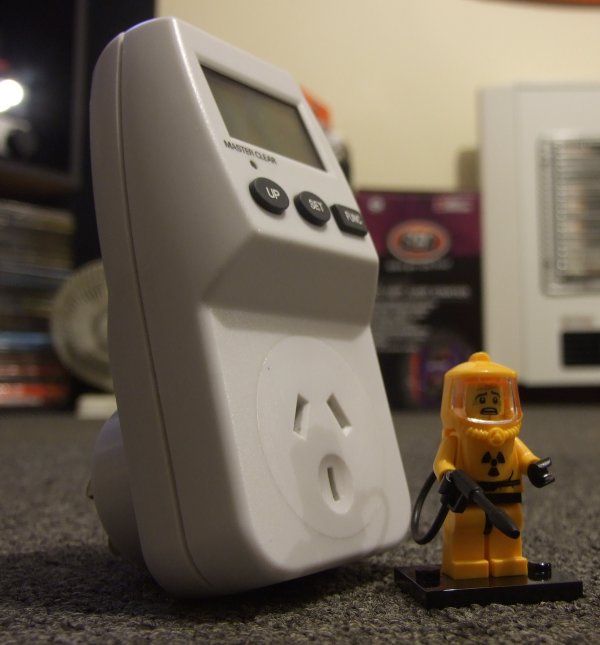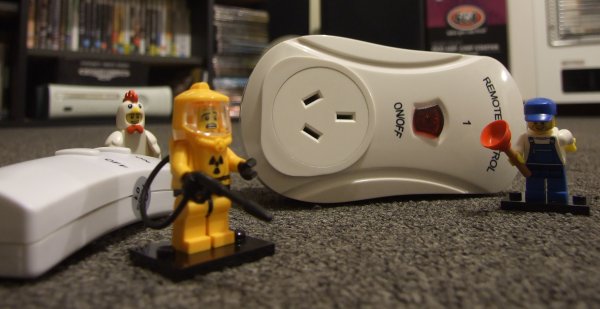Power Point Theory...Author: jawapro
Date: Tue 11/06/2013 08:45 PM
Ever met some crazy wack-jobs who tell you that they’ve been abducted by aliens, vegetables are sentient, and that you can save a bucket of money by turning things off at the power-point?
Well - turns out they might be right about the powerpoints.
Meet the mighty power-meter recorder gizmo thingy!
You plug it into the powerpoint and then plug whatever you want into it - and it can tell you how much power it’s using - and when you apply that to far too much math, you end up with a $ value for the quarter (power bills come once a quarter).
So having applied some science and technology to the wack-job’s claims, what did we find out? Well - for one thing, technology isn’t cheap…
I always assumed that my wide-screen TV would be expensive to run. And I’m not wrong - if I left it going all the time, it would cost me $90 a quarter. That’s why I turn it off when I’m not using it.
But plugged into that TV is a computer called Jordan (named after the Crossing Jordan chick, not the basketball player, or the river). I regularly left Jordan running because it was easier than turning her on each time. Turns out it costs $60 to run Jordan for a quarter. Plus an extra $5 for the external USB drive.
That’s making the power-hungry TV seem not-so-bad!
Speaking of computers - I also left my main PC (called Phaeton) running most of the time. It does various things when I’m not using it (including backing up this website) so I was quite happy leaving it running.
But the cost?
Turns out Phaeton costs $100 a quarter left running! Ok - so the TV isn’t the hog I thought it was.
Lets try shutting Phaeton down. If I left it power off all quarter, it would still cost me $25, WHAT!
That’s right - shut down, it’s still drawing enough power to cost $25.
The TV turned off would cost $13, and Jordan would cost $12.
Turning things off at the powerpoint suddenly looks more attractive.
I have three computer monitors in my office, and they each draw $5 turned off. Turned on it’s more like $20. If you tell your computer to turn off the monitors when you’re not using them, that drops down to the turned off rate - but that’s still using power.
My evaporative cooler (poor-man’s aircon) hasn’t been used since summer, but it costs $15 a quarter just being plugged in.
My VCR hasn’t been used in years, but it draws $3 (ok - so that’s not much of a saving…)
I couldn’t believe it - the wackjobs are right!
Of course - you can’t save the full amount on any of the above items - because you’ll want to use the computers and tvs some of the time - but turning them off when you’re not suddenly seems more attractive. I’d assumed you might save $30 a quarter or something - but there’s a good chance it’ll be far more than that.
So I’ve decided to build a Virtual server and run it on Jason’s PC (which he leaves at my place). His PC is called Castle - and somehow is very cheap to run - $30 a quarter. If I transfer the offline tasks that Phaeton runs onto my VM (called Beckett) that means I can shut Phaeton down when I’m not at home. That should be noticeable on my power bill.
Just for a test - I bought this remote power switch. It’s just a power switch with a remote control to turn it off and on. If I put it behind the TV (which is hard to get to) it means I can turn that off when I don’t need it too. Hey - it was cheap on ebay…
Don’t worry - I’m not about to start going on crusades to get everyone to stop using power - but it surprised me when I did some actual checking. So I’ll try turning things off a little more - and see if it makes an impact on the bill. If it doesn’t, I’ll go back to business as usual.
Be warned though - electronics like having power. Turning the power off all the time isn’t actually good for them. During my testing to find the figures above - I managed to toast both an old network switch and an old wifi access point.
So I’ll risk turning some stuff off more often - and see how it changes the bill. I’ll report back afterwards and we’ll see what it did (and how many devices have fried which could easily offset the savings).
Comments: 3




